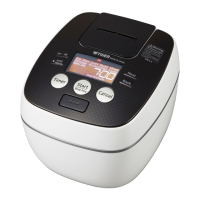27
26
27
26
9
Reheating Cooked Rice
For piping hot rice, reheat the rice that is being kept
warm before serving it.
Note
● Rice will not be fully heated if more than half of
the inner pot is full.
● The rice will end up dry if reheated under any of
the following conditions.
• The rice is still hot, such as immediately after
cooking.
• There is less than the minimum required
amount of rice (1 cup with the 1.0 L type, 2
cups with the 1.8 L type).
• The rice is reheated 3 times or more.
1
Stir and loosen the rice that was
being kept warm.
2
Add 1 to 2 tablespoons of water
evenly over the rice.
● Adding water will prevent the rice from drying out
and result in plumper rice.
3
Make sure that the Keep Warm
lamp is on.
On
• Reheating is not available if the Keep Warm
lamp is not on. If the lamp is not on, press
the [KeepWarm] key. (See P.24.)
4
Press the [Start/Rinse-free] key.
Blinks
Blinks
Off
Displays the
remaining
time
On
Long
Beep
Alarm
(3 long beeps)
• To stop reheating, press the [Cancel] key.
• Reheating is not available if the rice is too
cold (under about 55°C). In this case, a
repeated beeping alarm will sound.
5
Stir and loosen the reheated
rice well, and even it out in the
inner pot.
English
10
Slow Cooking (“Slow Cook” Menu)
You can prepare the following dishes with ease.
Refer to “Menu Guide” (P.43) for directions.
With this menu, food is rst brought to near boiling,
the heat is then lowered to about 94°C and the
food left to simmer. The temperature is then
lowered even further to about 86°C and simmering
is continued. By gradually lowering the heating
temperature in this way, avors are enhanced and
the liquids do not boil down even when heated for a
long period of time.
Menu examples
Vegetable and chicken pot-au-feu, Stew of
Cubed Pork
Unsuitable dishes
• Thick soup such as curry sauce and cream sou
• Using baking soda or such other agent that
causes sudden foaming
• Recipes in commercially available "COOKBOOK"
for rice cooker
• Heating ingredients or seasoning in a plastic
bag, etc.
• Using unpeeled tomatoes or leafy vegetables
that may cause the clogged pressure adjusting
hole
• Using parchment paper, aluminum foil and
plastic wrap that may cause the clogged
pressure adjusting hole
• Fish paste, beans (to be simmered) and noodle
that expand in volume
• Using much oil
● For how to cook “Vegetable and chicken pot-au-
feu” and “Stew of Cubed Pork”, see “Menu Guide”
(P.43).
Note
● Caution should be exercised when making dishes
other than those described in “Menu Guide”, as
they may boil over.
● Stir well before cooking to prevent seasonings
from settling at the bottom of the inner pot.
● When simmering foods in broth, cool the broth
before cooking.
Basic cooking procedure
1
Prepare the ingredients.
2
Add ingredients to the inner pot
and close the lid.
Note
● Use the “Plain” scale on the inside of the inner pot
as a reference. Using more than the maximum
acceptable amount (see the table below) can
prevent proper boiling or cause the contents to
boil over. Be careful also not to use less than the
minimum required amount either, as that can also
cause the contents to boil over.
“Plain” scale
1.0 L type 1.8 L type
Maximum Minimum Maximum Minimum
5 or below 2 or above 8 or below 3 or above
3
Connect each end of the power
cord to the specied locations.
Appliance
plug
(1) Connect
Power plug
(2) Connect
4
Press the [Next] or [Back] key
to select the “Slow Cook”
menu.
Blinks
Beep

